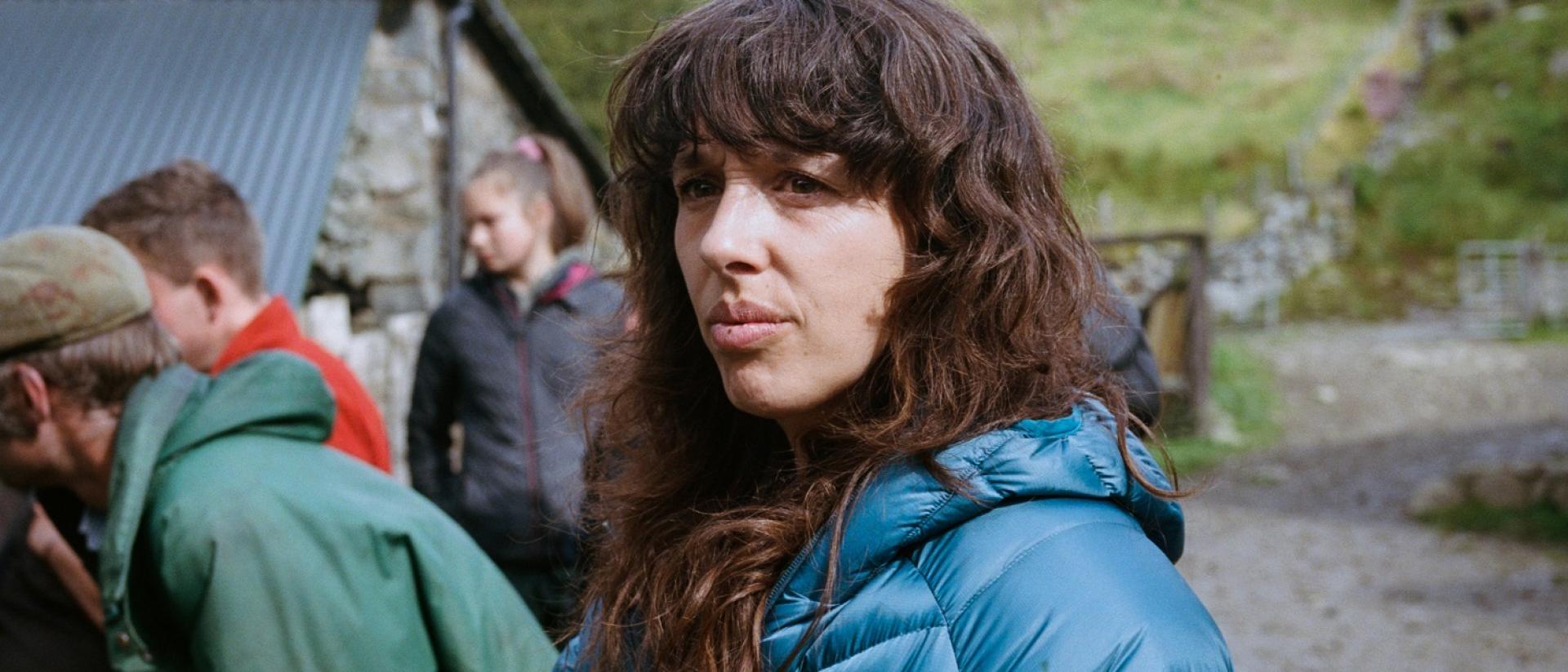Meet The Beacons Makers: Zillah Bowes
To celebrate the BBC broadcast of short films made through our Beacons scheme, Ffilm Cymru are sharing a series of interviews introducing the new and emerging Welsh filmmakers that made them.
In Zillah Bowes’ portrait of rural life in mid Wales Staying (Aros Mae), a woman from the city makes a brief but life-changing connection with a hill farmer and the landscape.
Before the first broadcast of Staying (Aros Mae), we spoke to Zillah about her inspirations, experiences and plans for the future.
Hi, can you tell us a little bit about yourself?
I’m a filmmaker, artist and writer. I grew up in the countryside and re-discovered it a few years ago when I moved to the mountains, which had a transformative effect on my work. A lot of my recent work explores the relationship between the individual and the natural environment but this may change! My practice as an artist has a spiritual enquiry around climate change. As a filmmaker, I’m also interested in division in relationships and society, and how it does or doesn’t resolve. I seem to spend a lot of time with people and places as a research process. I’m often most inspired by being in the world - observing, hanging out - which I then combine with imagery which stems from inside me, so the result is perhaps more poetic than realistic.
What inspired you to make Staying (Aros Mae)?
Just before I wrote Staying, I was artist-in-residence near Rhayader, Mid Wales. I’d begun to know my neighbours, a remote community of tenant hill farmers - some still gathering sheep on horseback - whose lives were changing due to the climate crisis, Brexit and economic uncertainty. Several had encouraged me to photograph them, which I’d started to do for a different project Green Dark. I set Staying in this community as a fictional story, mainly casting local people apart from my lead, actor and 9Bach singer Lisa Jên Brown. I’d previously lived further north, where I’d seen a video posted online by a farmer selling his sheepdog. It brought me into the moment he’d taken it. The image stayed with me and became the start of the story: a woman sees a video of a dog for sale and travels to find it on a whim, fleeing the pain of a break-up.
How did you find moving from cinematography into directing?
I trained in both cinematography and documentary directing at the NFTS, and worked in both afterwards, so it wasn’t that big of a jump to move into fiction directing. I’d worked on fiction films as a cinematographer and directed documentary projects. I’d also previously done courses in screenwriting and directing actors as well as acting. Staying is my first fiction film as a writer/director and my main learning curve was writing and developing the script, and working with actors and non-actors. I had to learn most to trust my instinct, especially when casting! It was exciting and rewarding, and confirmed to me that I want to continue to make fiction films.
What kind of support did Ffilm Cymru & BFI NETWORK give you?
There were many great things about being on the Beacons scheme with Ffilm Cymru, BFI NETWORK and BBC Cymru Wales. It was useful to have the development process first before moving into production. That helped me separate out the different stages of the project as a writer/director. It was good practice to have to pitch for our production funding too. A lot of the processes we went through mirrored those of a feature and I’m finding them invaluable now. It was also important for us to have a budget and for it to be reflected in the production value of the film. It’s enabled us to show Staying at great venues and festivals internationally.
The film was shot on 16mm by iconic cinematographer Robbie Ryan; how did you attract such high-profile talent to your project?
I wanted to shoot fluidly and reactively, to follow my main character as she moved in and out of people, animals and nature, and to capture her interiority. I wanted to be both handheld and visually lyrical. My producer, Jack Thomas-O’Brien, and I felt Robbie would be amazing for this, and we knew he sometimes worked on shorts. We hoped he might be interested in the community and how they work in the landscape with horses, as it’s so unique. And like Jack, he’d worked with our production company Sixteen Films with director Ken Loach, and had experience with non-actors. So we initially shared some of the early photography from my Green Dark series and a story outline with him, followed by the script. And we were incredibly lucky that he was interested in working with us and available. He was brilliant and so generous on the shoot, such a great collaborator!
What will you be working on next?
I’m developing my first feature as a writer/director with my producer Jack at Sixteen Films and Ffilm Cymru. I’ve recently completed the LIM (Less is More) development programme in France, which has an emphasis on oral storytelling. It was inspiring - I had wonderful writing mentors and met a supportive group of filmmakers. My film is a coming-of-age eco-protest road movie with a young female main character. I’m enjoying how the development process seems to expand a different element of the characters and story at a time. I’m really looking forward to the next stages of making it.
Staying (Aros Mae) was produced by Jack Thomas-O'Brien at Sixteen Films through Ffilm Cymru and BFI NETWORK’s Beacons scheme in association with BBC Cymru Wales. Watch it on BBC Two on Thursday 8th December at 23:35.

